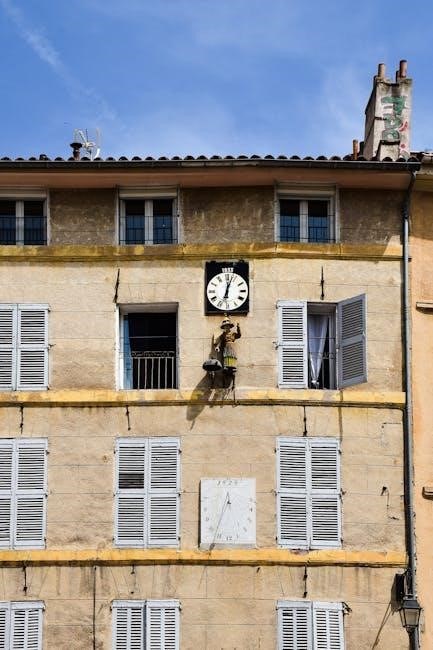The Allied bombings in France during WWII were a crucial part of the liberation strategy, targeting key military and industrial sites to weaken German forces.

Overview of the Allied Strategy During World War II
The Allied strategy during WWII included systematic bombing campaigns in France to disrupt German military and industrial capabilities. These operations, conducted by British and American forces, targeted key infrastructure such as railways, ports, and factories supplying Nazi troops. The bombings aimed to weaken Germany’s ability to sustain its occupation and prepare the ground for the liberation of Western Europe. By focusing on strategic locations, the Allies sought to minimize civilian casualties while maximizing military impact. This approach was crucial in supporting ground forces and ensuring the success of operations like D-Day, ultimately paving the way for France’s liberation.
Historical Context of Allied Bombings in France
The Allied bombings in France were part of a broader strategy to weaken Nazi Germany’s grip on Western Europe during WWII. France, under German occupation since 1940, became a critical target for disrupting enemy supply lines and industrial production; The bombings intensified as the Allies prepared for the liberation of Europe, particularly before D-Day. Strategic targets included railways, bridges, and industrial complexes, aiming to hamper German troop movements and armament production. These operations were coordinated with intelligence from the French Resistance, ensuring precision and maximizing impact. Despite efforts to minimize civilian losses, the bombings caused significant damage and casualties, leaving a lasting mark on French society and history.

Key Events and Battles
The Allied bombings in France targeted strategic locations, with the Normandy Campaign and the bombing of key cities like Caen and Rouen being pivotal in weakening German defenses.
The Normandy Campaign and Its Impact
The Normandy Campaign, a pivotal operation during WWII, involved extensive Allied bombings to weaken German defenses and secure key coastal areas. The bombings targeted strategic military installations, roads, and bridges, disrupting enemy supply lines and communication networks. This relentless aerial assault played a crucial role in the D-Day invasion, enabling ground forces to establish a foothold on French soil. The campaign not only liberated Normandy but also set the stage for the broader liberation of France. The bombings, however, also caused significant civilian casualties and widespread destruction, leaving a lasting impact on local communities and infrastructure; The Normandy Campaign remains a defining moment in the Allied victory, showcasing the power of coordinated military strategy.
Bombing of Key French Cities
The Allied bombings of key French cities during WWII were part of a broader strategy to disrupt German military and industrial capabilities. Cities like Caen, Rouen, and Le Havre were heavily targeted due to their strategic importance as transportation hubs and industrial centers. These bombings aimed to sever supply lines and weaken enemy resistance, facilitating the liberation of occupied territories. However, the campaigns also resulted in significant civilian casualties and widespread destruction of infrastructure, leaving lasting scars on the affected communities.
The bombing of these cities played a critical role in the Allied advance, but it also underscored the tragic human cost of wartime strategies. The devastation had long-term economic and social impacts, shaping post-war reconstruction efforts in France.

Human Cost and Aftermath

The Allied bombings caused significant civilian casualties, displacement, and long-term emotional trauma, leaving deep scars on French communities and shaping post-war social dynamics.
Civilian Casualties and Displacement
The Allied bombings in France caused significant civilian casualties and widespread displacement. Thousands of innocent lives were lost, and entire neighborhoods were reduced to rubble. Many cities, such as Caen and Le Havre, suffered heavily, forcing residents to flee their homes. The destruction of infrastructure left people without essential services, exacerbating the humanitarian crisis. Displaced populations faced dire conditions, including food shortages and inadequate shelter. This trauma had lasting effects on communities, shaping post-war social and economic challenges. The bombings remain a poignant reminder of the human cost of conflict, deeply etched in France’s collective memory and historical narrative.

The Refugee Crisis
The Allied bombings in France led to a severe refugee crisis, as thousands fled their homes to escape the devastation. Cities like Caen and Le Havre were particularly hard hit, displacing entire populations. Many refugees faced harsh conditions, including lack of food, shelter, and medical care. The destruction of infrastructure left communities isolated, further exacerbating the crisis. Temporary camps and makeshift shelters struggled to accommodate the influx of displaced individuals. This mass displacement had a profound impact on French society, creating long-term social and economic challenges. The refugee crisis remains a somber reminder of the human toll of wartime bombings, deeply affecting families and communities for years to come.
Military and Strategic Impact

The Allied bombings significantly weakened German forces in France by targeting military installations and supply lines, disrupting Axis operations and supporting the advancement of ground troops effectively.
Bombing of Industrial and Military Targets

The Allied bombings in France focused heavily on industrial and military targets, aiming to cripple Germany’s war production and logistical capabilities. Factories producing weapons and ammunition, as well as key transportation hubs like railways and ports, were primary targets. These strikes disrupted supply lines, hindering the German army’s ability to maintain operations in occupied territories. The destruction of industrial facilities also weakened the Axis war effort by reducing the production of essential military equipment. The strategic bombing campaign played a pivotal role in weakening German defenses, facilitating the advancement of Allied forces during the liberation of France. This approach was central to the broader military strategy of undermining enemy strength from both the air and the ground.
Role of the French Resistance
The French Resistance played a pivotal role in supporting Allied bombing campaigns by providing critical intelligence on German military installations and industrial sites. Resistance fighters risked their lives to sabotage railways, bridges, and communication lines, disrupting enemy supply chains and troop movements. Their efforts directly complemented Allied airstrikes, ensuring maximum impact on German operations. Additionally, the Resistance facilitated the escape of downed Allied airmen, enabling them to rejoin the fight. Despite facing brutal reprisals, the Resistance’s bravery and resilience were instrumental in weakening German control over France, paving the way for the successful liberation of the country. Their contributions remain a testament to their unwavering commitment to freedom and resistance against oppression.
Legacy and Remembrance
The Allied bombings in France left a lasting impact, remembered through memorials and commemorations honoring the lives lost and the shared struggle for liberation during WWII.
Memorials and Commemoration
France honors the legacy of Allied bombings through numerous memorials and commemorative events. Sites like the Normandy American Cemetery and museums dedicated to D-Day reflect the shared history of liberation. Many towns have plaques and monuments remembering civilian sacrifices and the impact of bombings. Annual ceremonies and reenactments keep the memories alive, fostering a sense of gratitude and remembrance. These tributes not only acknowledge the Allied efforts but also highlight the resilience of the French people during wartime. By preserving these histories, future generations can learn from the past and appreciate the sacrifices made for freedom.

Impact on French Society and Culture
The Allied bombings in France during WWII profoundly shaped the nation’s society and culture. The destruction of cities and loss of life fostered a collective trauma, influencing post-war reconstruction efforts. Many French communities rebuilt with a focus on resilience and modernization, while others preserved historical sites as reminders of the war. Culturally, the bombings inspired literature, art, and films reflecting on the human cost and liberation. The events also strengthened French identity, emphasizing unity and the importance of peace. Today, these experiences remain a significant part of France’s historical narrative, contributing to its cultural heritage and informing its approach to global conflicts.
